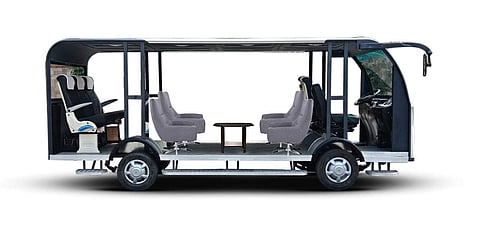

Over 300 students of the Lovely Professional University have designed and built a driverless solar-powered bus. The bus is slated to enter commercial service later this year and the first prototype will welcome Prime Minister Narendra Modi for the inauguration of the Indian Science Congress at LPU on January 3, 2019.
Students from multiple academic fields like Mechanical, Electrical, and Computer Engineering collaborated under the guidance of LPU professors and experts to design and fabricate the vehicle. The fabrication is being done at the LPU Project Studio. "The vehicle needs to be controlled from outside. Since the system is connected to the internet it can be controlled from anywhere in the world. It's as precise as a robotics guided surgery. There will be cameras mounted on the vehicle so that the driver has eyes on the road," said Dr Sorabh Lakhanpal, Dean of Students' Welfare, LPU. "We are at a point where we should shift to renewable fuel options and solar energy is one of the most sustainable types of energy. We have tried to merge the concept of renewable energy fueled vehicle with the precision of a driverless bus."
Unlike most hybrid vehicles that use an internal combustion engine along with an electric motor, the bus designed by LPU students is completely pollution free and uses only renewable energy in the form of electric motor and solar power for propulsion. Students have used a technology called the Vehicle-to-Vehicle (V2V) communication to make the bus driverless. The technology works by using wireless signals detected through ultra-sonic and infrared sensors. The bus also uses GPS and Bluetooth for navigation. The motor controller adjusts the amount of energy that flows to the motor to correspond to the throttle. “We are very happy to design a completely driverless and eco-friendly bus to welcome Prime Minister Narendra Modi. If his schedule and security arrangements permit, we would love to give him a tour of our campus in the bus,” said project lead, Mandeep Singh.
Once launched commercially, the bus will be used at airports, housing societies, industrial complexes, and educational institutions. "We have already spoken to a few hotels, schools, colleges and other institutions who require transportation within their campuses," added Sorabh. The design of the bus has been done keeping in mind Indian conditions and it will cost Rs 6 lakhs, which is just a fraction of what a generic bus costs. Since the engine is battery and solar powered, the running cost is essentially negligible. The bus has a maximum speed of 30 km per hour and can seat up to 30 people, depending on the seat arrangements.
“The driverless bus is another example of LPU students being at the forefront of technology. LPU is one of the few universities from the country that have represented India at renowned global competitions like NASA Rover Challenge and international go-kart championship, said Chancellor Ashok Mittal. "The India Science Congress will be great exposure for our students and they are very excited about it.
